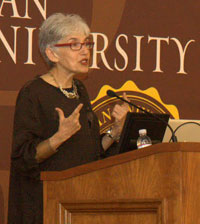President's Lecture Series features author Dava Sobel
President's Lecture Series features author Dava Sobel

Celebrated science writer Dava Sobel, a finalist for a Pulitzer Prize and author of numerous best-sellers including Longitude and Galileo’s Daughter, addressed the Rowan University community October 28 in celebration of the International Year of Astronomy.
Sobel, a former New York Times reporter who spent 30 years as a science writer, told a packed audience in the Eynon Ballroom that students need not worry if they don’t know exactly what they want to do the moment they graduate.
“When I was in school, science writing was not a designated career path,” said Sobel, 62. “Don’t despair. You’ll figure it out.”
Likewise, the great Galileo, who has been hailed as the father of modern astronomy, the father of modern physics, even the father of science, didn’t set out with such lofty goals.
Sobel said he built and sold telescopes and other equipment to military and commercial interests before turning his lenses skyward. As an astronomer, he is credited with numerous discoveries and observations including that of the four moons of Jupiter.
“That was monumental,” Sobel said.
Ironically, she noted, “if you have a halfway decent pair of binoculars, you probably have a more sophisticated piece of equipment than Galileo.”
She said though Galileo was a devout Roman Catholic (his two daughters even became nuns), he was considered a heretic for some of his controversial writings and was ultimately sentenced to home imprisonment.
“He was a believing Catholic but felt the Church had no place dictating the study of astronomy,” Sobel said. “Galileo has become a symbol of irreconcilable differences between science and religion. I hope an outcome of this International Year of Astronomy is that we can set the record straight.”
According to a web site hosted by the United Nations Educational, Scientific and Cultural Organization and the International Astronomical Union, the International Year of Astronomy is significant for several reasons. First, because 2009 marks the 400th anniversary of Galileo’s first use of an astronomical telescope, and second because it is helping stimulate worldwide interest in astronomy and science.
Introducing Sobel, Rowan President Dr. Donald Farish said he read her book Longitude (the story of a clockmaker who resolved a life-and-death navigational problem) ten years before she spoke here.
“One of the most important talents in society is the small percentage of people who can communicate science to the broader (non-scientific) audience,” Dr. Farish said. “Ms. Sobel is such a person.”
After the lecture senior chemistry major John Cong of Bridgeton said he’d been interested in astronomy before but knew little of the history behind it.
“Using the tools they used – a simple lens with a scope – it’s interesting to know they were able to discover so much,” he said.